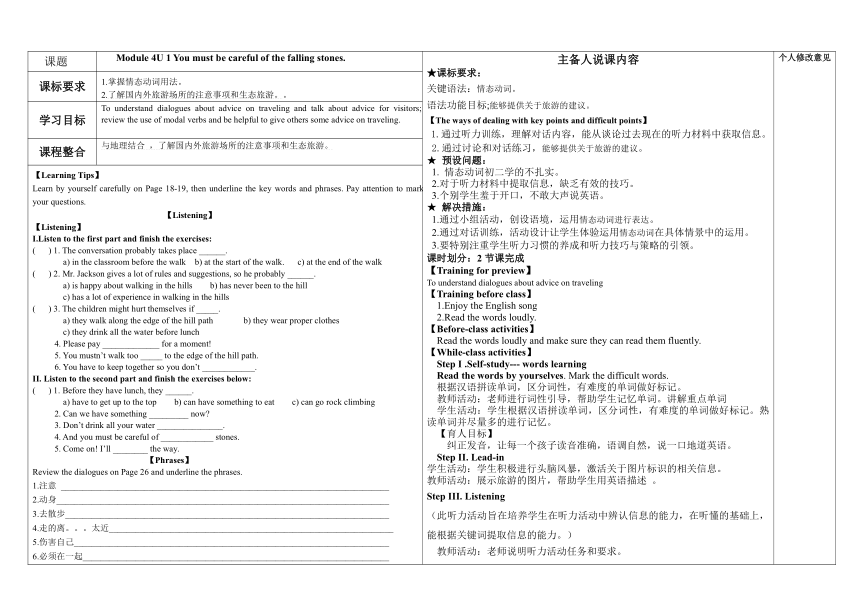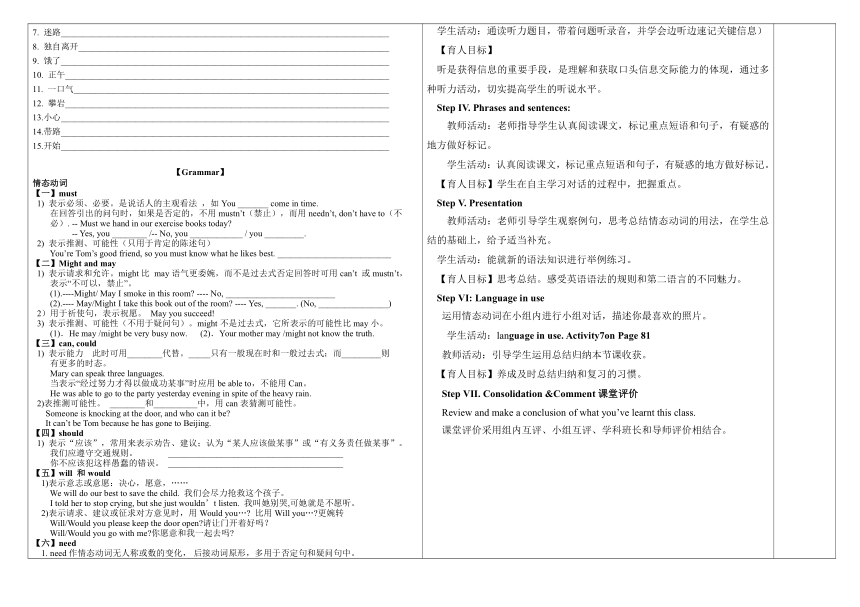Module 4 Rules and suggestions Unit 1 You must be careful of falling stones. 备课设计(表格式) 2023-2024学年外
文档属性
| 名称 | Module 4 Rules and suggestions Unit 1 You must be careful of falling stones. 备课设计(表格式) 2023-2024学年外 |

|
|
| 格式 | docx | ||
| 文件大小 | 29.5KB | ||
| 资源类型 | 教案 | ||
| 版本资源 | 外研版 | ||
| 科目 | 英语 | ||
| 更新时间 | 2024-06-12 16:27:52 | ||
图片预览


文档简介
课题 Module 4U 1 You must be careful of the falling stones. 主备人说课内容 ★课标要求: 关键语法:情态动词。 语法功能目标;能够提供关于旅游的建议。 【The ways of dealing with key points and difficult points】 1.通过听力训练,理解对话内容,能从谈论过去现在的听力材料中获取信息。 2.通过讨论和对话练习,能够提供关于旅游的建议。 预设问题: 1. 情态动词初二学的不扎实。 2.对于听力材料中提取信息,缺乏有效的技巧。 3.个别学生羞于开口,不敢大声说英语。 解决措施: 1.通过小组活动,创设语境,运用情态动词进行表达。 2.通过对话训练,活动设计让学生体验运用情态动词在具体情景中的运用。 3.要特别注重学生听力习惯的养成和听力技巧与策略的引领。 课时划分:2节课完成 【Training for preview】 To understand dialogues about advice on traveling 【Training before class】 Enjoy the English song 2.Read the words loudly. 【Before-class activities】 Read the words loudly and make sure they can read them fluently. 【While-class activities】 Step I .Self-study--- words learning Read the words by yourselves. Mark the difficult words. 根据汉语拼读单词,区分词性,有难度的单词做好标记。 教师活动:老师进行词性引导,帮助学生记忆单词。讲解重点单词 学生活动:学生根据汉语拼读单词,区分词性,有难度的单词做好标记。熟读单词并尽量多的进行记忆。 【育人目标】 纠正发音,让每一个孩子读音准确,语调自然,说一口地道英语。 Step II. Lead-in 学生活动:学生积极进行头脑风暴,激活关于图片标识的相关信息。 教师活动:展示旅游的图片,帮助学生用英语描述 。 Step III. Listening (此听力活动旨在培养学生在听力活动中辨认信息的能力,在听懂的基础上,能根据关键词提取信息的能力。) 教师活动:老师说明听力活动任务和要求。 学生活动:通读听力题目,带着问题听录音,并学会边听边速记关键信息) 【育人目标】 听是获得信息的重要手段,是理解和获取口头信息交际能力的体现,通过多种听力活动,切实提高学生的听说水平。 Step IV. Phrases and sentences: 教师活动:老师指导学生认真阅读课文,标记重点短语和句子,有疑惑的地方做好标记。 学生活动:认真阅读课文,标记重点短语和句子,有疑惑的地方做好标记。 【育人目标】学生在自主学习对话的过程中,把握重点。 Step V. Presentation 教师活动:老师引导学生观察例句,思考总结情态动词的用法,在学生总结的基础上,给予适当补充。 学生活动:能就新的语法知识进行举例练习。 【育人目标】思考总结。感受英语语法的规则和第二语言的不同魅力。 Step VI: Language in use 运用情态动词在小组内进行小组对话,描述你最喜欢的照片。 学生活动:language in use. Activity7on Page 81 教师活动:引导学生运用总结归纳本节课收获。 【育人目标】养成及时总结归纳和复习的习惯。 Step VII. Consolidation &Comment课堂评价 Review and make a conclusion of what you’ve learnt this class. 课堂评价采用组内互评、小组互评、学科班长和导师评价相结合。 个人修改意见
课标要求 1.掌握情态动词用法。 2.了解国内外旅游场所的注意事项和生态旅游。。
学习目标 To understand dialogues about advice on traveling and talk about advice for visitors; To review the use of modal verbs and be helpful to give others some advice on traveling.
课程整合 与地理结合 ,了解国内外旅游场所的注意事项和生态旅游。
【Learning Tips】 Learn by yourself carefully on Page 18-19, then underline the key words and phrases. Pay attention to marking your questions. 【Listening】 【Listening】 I.Listen to the first part and finish the exercises: ( ) 1. The conversation probably takes place ______. a) in the classroom before the walk b) at the start of the walk. c) at the end of the walk ( ) 2. Mr. Jackson gives a lot of rules and suggestions, so he probably ______. a) is happy about walking in the hills b) has never been to the hill c) has a lot of experience in walking in the hills ( ) 3. The children might hurt themselves if _____. a) they walk along the edge of the hill path b) they wear proper clothes c) they drink all the water before lunch 4. Please pay _____________ for a moment! 5. You mustn’t walk too _____ to the edge of the hill path. 6. You have to keep together so you don’t ____________. II. Listen to the second part and finish the exercises below: ( ) 1. Before they have lunch, they ______. a) have to get up to the top b) can have something to eat c) can go rock climbing 2. Can we have something _________ now 3. Don’t drink all your water _______________. 4. And you must be careful of ____________ stones. 5. Come on! I’ll ________ the way. 【Phrases】 Review the dialogues on Page 26 and underline the phrases. 1.注意 ___________________________________________________________________________ 2.动身____________________________________________________________________________ 3.去散步__________________________________________________________________________ 4.走的离。。。太近_________________________________________________________________ 5.伤害自己________________________________________________________________________ 6.必须在一起______________________________________________________________________ 7. 迷路___________________________________________________________________________ 8. 独自离开_______________________________________________________________________ 9. 饿了___________________________________________________________________________ 10. 正午__________________________________________________________________________ 11. 一口气________________________________________________________________________ 12. 攀岩__________________________________________________________________________ 13.小心___________________________________________________________________________ 14.带路___________________________________________________________________________ 15.开始___________________________________________________________________________ 【Grammar】 情态动词 【一】must 1) 表示必须、必要。是说话人的主观看法 ,如You _______ come in time. 在回答引出的问句时,如果是否定的,不用mustn’t(禁止),而用needn’t, don’t have to(不 必). -- Must we hand in our exercise books today -- Yes, you ________ /-- No, you ____________ / you _________. 2) 表示推测、可能性(只用于肯定的陈述句) You’re Tom’s good friend, so you must know what he likes best. __________________________ 【二】Might and may 1) 表示请求和允许。might比 may语气更委婉,而不是过去式否定回答时可用can’t 或mustn’t, 表示“不可以,禁止”。 (1).----Might/ May I smoke in this room ---- No, _________________________ (2).---- May/Might I take this book out of the room ---- Yes, _______. (No, ________________) 2)用于祈使句,表示祝愿。 May you succeed! 3) 表示推测、可能性(不用于疑问句)。might不是过去式,它所表示的可能性比may小。 (1).He may /might be very busy now. (2).Your mother may /might not know the truth. 【三】can, could 1) 表示能力 此时可用________代替。_____只有一般现在时和一般过去式;而_________则 有更多的时态。 Mary can speak three languages. 当表示“经过努力才得以做成功某事”时应用be able to,不能用Can。 He was able to go to the party yesterday evening in spite of the heavy rain. 2)表推测可能性。 ________和__________中,用can表猜测可能性。 Someone is knocking at the door, and who can it be It can’t be Tom because he has gone to Beijing. 【四】should 1) 表示“应该”,常用来表示劝告、建议;认为“某人应该做某事”或“有义务责任做某事”。 我们应遵守交通规则。 ________________________________________ 你不应该犯这样愚蠢的错误。 ________________________________________ 【五】will 和would 1)表示意志或意愿:决心,愿意,…… We will do our best to save the child. 我们会尽力抢救这个孩子。 I told her to stop crying, but she just wouldn’t listen. 我叫她别哭,可她就是不愿听。 2)表示请求、建议或征求对方意见时,用Would you… 比用Will you… 更婉转 Will/Would you please keep the door open 请让门开着好吗? Will/Would you go with me 你愿意和我一起去吗 【六】need 1. need作情态动词无人称或数的变化, 后接动词原形,多用于否定句和疑问句中。 You needn’t _______(worry). 你不必担心 2. 由need引出的一般疑问句,肯定回答常用______或______;否定答语常用_______. 如: --- Need I answer the question —Yes, _______ _________. ---Yes, you have to.是的,你必须回答。---No,you_________ _________/you _______________ 更不害怕… 如何处理普通的疾病5.人们不如过去做锻炼多。 6. 更多的财富意味着更少的健康。 7. 车的数量 8. 更糟糕9. 她见证了生活是如何改变的。 10. 记得要大声说 11. 有点儿耳聋 【Grammar】 1.形容词的句法功能: 形容词可放在名词之前作定语,也可放系动词之后作表语,还可作宾语补足语等 eg. (1)You must be very ___________(care) with your bags. (2) The song sounds very _________(beauty) (3) It’s a really __________(love) dog. (4) We must keep the room _________(clean) (5) People’s life seems _________(busy) now. 2. 形容词如果修饰的是不定代词something, anything, nothing, somebody, anybody, nobody等,就要放在后面。 eg. Is there _____________________(一些特别的事) on today’s newspaper 3. 副词的句法功能: 副词一般用作状语,修饰动词、形容词、副词及全句,表示程度、方式. eg. (1) They speak very ________(high) of you. (2) He is _________(terrible) ill today. (3) Nobody was _________(bad) hurt in the accident. (4) ________(luck), he didn’t pass the exam. (5) __________(hope), our world will be saved. 4. 形容词与副词的比较级和最高级 1) 比较级+than,表示“比…更…” (1) Health is ______________(更重要)than wealth. (2)He got up____________(早) than I did this morning. 2) 比较级+ and+比较级,表示“越来越……”。 (1) The story gets ________________________(越来越激动人心) (2)Our lives are getting _________________(越来越好) 3)The+比较级,the+比较级,表示“越……,越……” (1)______ _____ you spend time on it, _____ _____ progress you will make. 你花的时间越多, 你取得的进步就会越大。 (2)____ ______ cars on roads, ______ _____ pollution. 路上的车越少,污染就会越少。 5.同级比较一般采用as...as…句型,否定句可以用not so / as…表示。 He is ______________(一样大)as me. He ____ write__________________me. 他写的不如我认真。 6. 常见的最高级表达方式有: 1) the+ 最高级+ of/in… eg. (1) Jim is ________________ the three. Jim 是三个人最高的。 2) 选择疑问句 eg. Which is _____________(far), the sun, the moon or the Mars 3) the+最高级+定语从句 eg. This is _______________________________________(我曾读过的最有趣的书) 7.比较级和最高级的修饰语。常见的比较级修饰语有__________________________等。
课标要求 1.掌握情态动词用法。 2.了解国内外旅游场所的注意事项和生态旅游。。
学习目标 To understand dialogues about advice on traveling and talk about advice for visitors; To review the use of modal verbs and be helpful to give others some advice on traveling.
课程整合 与地理结合 ,了解国内外旅游场所的注意事项和生态旅游。
【Learning Tips】 Learn by yourself carefully on Page 18-19, then underline the key words and phrases. Pay attention to marking your questions. 【Listening】 【Listening】 I.Listen to the first part and finish the exercises: ( ) 1. The conversation probably takes place ______. a) in the classroom before the walk b) at the start of the walk. c) at the end of the walk ( ) 2. Mr. Jackson gives a lot of rules and suggestions, so he probably ______. a) is happy about walking in the hills b) has never been to the hill c) has a lot of experience in walking in the hills ( ) 3. The children might hurt themselves if _____. a) they walk along the edge of the hill path b) they wear proper clothes c) they drink all the water before lunch 4. Please pay _____________ for a moment! 5. You mustn’t walk too _____ to the edge of the hill path. 6. You have to keep together so you don’t ____________. II. Listen to the second part and finish the exercises below: ( ) 1. Before they have lunch, they ______. a) have to get up to the top b) can have something to eat c) can go rock climbing 2. Can we have something _________ now 3. Don’t drink all your water _______________. 4. And you must be careful of ____________ stones. 5. Come on! I’ll ________ the way. 【Phrases】 Review the dialogues on Page 26 and underline the phrases. 1.注意 ___________________________________________________________________________ 2.动身____________________________________________________________________________ 3.去散步__________________________________________________________________________ 4.走的离。。。太近_________________________________________________________________ 5.伤害自己________________________________________________________________________ 6.必须在一起______________________________________________________________________ 7. 迷路___________________________________________________________________________ 8. 独自离开_______________________________________________________________________ 9. 饿了___________________________________________________________________________ 10. 正午__________________________________________________________________________ 11. 一口气________________________________________________________________________ 12. 攀岩__________________________________________________________________________ 13.小心___________________________________________________________________________ 14.带路___________________________________________________________________________ 15.开始___________________________________________________________________________ 【Grammar】 情态动词 【一】must 1) 表示必须、必要。是说话人的主观看法 ,如You _______ come in time. 在回答引出的问句时,如果是否定的,不用mustn’t(禁止),而用needn’t, don’t have to(不 必). -- Must we hand in our exercise books today -- Yes, you ________ /-- No, you ____________ / you _________. 2) 表示推测、可能性(只用于肯定的陈述句) You’re Tom’s good friend, so you must know what he likes best. __________________________ 【二】Might and may 1) 表示请求和允许。might比 may语气更委婉,而不是过去式否定回答时可用can’t 或mustn’t, 表示“不可以,禁止”。 (1).----Might/ May I smoke in this room ---- No, _________________________ (2).---- May/Might I take this book out of the room ---- Yes, _______. (No, ________________) 2)用于祈使句,表示祝愿。 May you succeed! 3) 表示推测、可能性(不用于疑问句)。might不是过去式,它所表示的可能性比may小。 (1).He may /might be very busy now. (2).Your mother may /might not know the truth. 【三】can, could 1) 表示能力 此时可用________代替。_____只有一般现在时和一般过去式;而_________则 有更多的时态。 Mary can speak three languages. 当表示“经过努力才得以做成功某事”时应用be able to,不能用Can。 He was able to go to the party yesterday evening in spite of the heavy rain. 2)表推测可能性。 ________和__________中,用can表猜测可能性。 Someone is knocking at the door, and who can it be It can’t be Tom because he has gone to Beijing. 【四】should 1) 表示“应该”,常用来表示劝告、建议;认为“某人应该做某事”或“有义务责任做某事”。 我们应遵守交通规则。 ________________________________________ 你不应该犯这样愚蠢的错误。 ________________________________________ 【五】will 和would 1)表示意志或意愿:决心,愿意,…… We will do our best to save the child. 我们会尽力抢救这个孩子。 I told her to stop crying, but she just wouldn’t listen. 我叫她别哭,可她就是不愿听。 2)表示请求、建议或征求对方意见时,用Would you… 比用Will you… 更婉转 Will/Would you please keep the door open 请让门开着好吗? Will/Would you go with me 你愿意和我一起去吗 【六】need 1. need作情态动词无人称或数的变化, 后接动词原形,多用于否定句和疑问句中。 You needn’t _______(worry). 你不必担心 2. 由need引出的一般疑问句,肯定回答常用______或______;否定答语常用_______. 如: --- Need I answer the question —Yes, _______ _________. ---Yes, you have to.是的,你必须回答。---No,you_________ _________/you _______________ 更不害怕… 如何处理普通的疾病5.人们不如过去做锻炼多。 6. 更多的财富意味着更少的健康。 7. 车的数量 8. 更糟糕9. 她见证了生活是如何改变的。 10. 记得要大声说 11. 有点儿耳聋 【Grammar】 1.形容词的句法功能: 形容词可放在名词之前作定语,也可放系动词之后作表语,还可作宾语补足语等 eg. (1)You must be very ___________(care) with your bags. (2) The song sounds very _________(beauty) (3) It’s a really __________(love) dog. (4) We must keep the room _________(clean) (5) People’s life seems _________(busy) now. 2. 形容词如果修饰的是不定代词something, anything, nothing, somebody, anybody, nobody等,就要放在后面。 eg. Is there _____________________(一些特别的事) on today’s newspaper 3. 副词的句法功能: 副词一般用作状语,修饰动词、形容词、副词及全句,表示程度、方式. eg. (1) They speak very ________(high) of you. (2) He is _________(terrible) ill today. (3) Nobody was _________(bad) hurt in the accident. (4) ________(luck), he didn’t pass the exam. (5) __________(hope), our world will be saved. 4. 形容词与副词的比较级和最高级 1) 比较级+than,表示“比…更…” (1) Health is ______________(更重要)than wealth. (2)He got up____________(早) than I did this morning. 2) 比较级+ and+比较级,表示“越来越……”。 (1) The story gets ________________________(越来越激动人心) (2)Our lives are getting _________________(越来越好) 3)The+比较级,the+比较级,表示“越……,越……” (1)______ _____ you spend time on it, _____ _____ progress you will make. 你花的时间越多, 你取得的进步就会越大。 (2)____ ______ cars on roads, ______ _____ pollution. 路上的车越少,污染就会越少。 5.同级比较一般采用as...as…句型,否定句可以用not so / as…表示。 He is ______________(一样大)as me. He ____ write__________________me. 他写的不如我认真。 6. 常见的最高级表达方式有: 1) the+ 最高级+ of/in… eg. (1) Jim is ________________ the three. Jim 是三个人最高的。 2) 选择疑问句 eg. Which is _____________(far), the sun, the moon or the Mars 3) the+最高级+定语从句 eg. This is _______________________________________(我曾读过的最有趣的书) 7.比较级和最高级的修饰语。常见的比较级修饰语有__________________________等。
同课章节目录
- Module 1 Travel
- Unit 1 We toured the city by bus and by taxi
- Unit 2 It's a long story.
- Unit 3 Language in use
- Module 2 Education
- Unit 1 They don't sit in rows.
- Unit 2 What do I like best about school?
- Unit 3 Language in use
- Module 3 Life now and then
- Unit 1 They sometimes work harder.
- Unit 2 I think life is better today.
- Unit 3 Language in use.
- Module 4 Rules and suggestions
- Unit 1 You must be careful of falling stones.
- Unit 2 we must keep the camp clean.
- Unit 3 Language in use.
- Revison A
- Module 5 Look after yourself
- Unit 1 We'd better get you to hospital.
- Unit 2 Get off the sofa!
- Unit 3 Language in use.
- Module 6 Eating togethe
- Unit 1 When is the school-leavers' party?
- Unit 2 Knives and forks are used for most Western
- Unit 3 Language in use
- Module 7 English for you and me
- Unit 1 Have you ever been to an English corner?
- Unit 2 We all own English.
- Unit 3 Language in use
- Module 8 My future life
- Unit 1 Here's to our friendship and the future
- Unit 2 I know that you will be better at maths.
- Unit 3 Language in use
- Revison B
